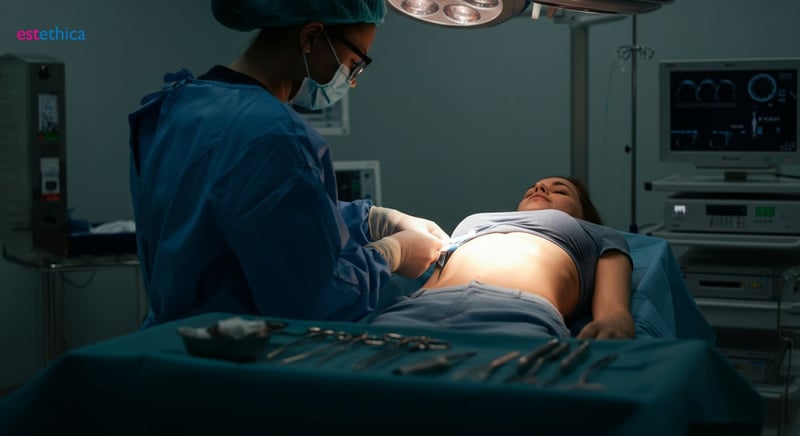Tummy Tuck Transformation: Reclaim Your Confidence After Pregnancy
Explore the transformative impact of a tummy tuck—a gateway to regaining your pre-pregnancy confidence with estethica's expert care.
Pregnancy is a transformative experience that brings immense joy and profound changes to a woman's body. However, for many, these changes can lead to a decrease in self-confidence, especially when it comes to their physical appearance. The tummy tuck, or abdominoplasty, has become a popular solution among mothers seeking to reclaim their pre-baby bodies and boost their self-esteem.
Understanding the dynamics of a tummy tuck, particularly after pregnancy, is crucial in making an informed decision. From the initial consultation to the recovery phase, each step of the tummy tuck procedure is designed to ensure that mothers not only achieve a flatter and firmer abdomen but also feel empowered and confident in their bodies once more.
This comprehensive guide will provide you with all the necessary insights into understanding what a tummy tuck entails, what to expect during the procedure, and key recovery tips to help you heal effectively. Additionally, we will explore the services provided by estethica, a leading healthcare group that prides itself on delivering top-notch cosmetic surgery services.
Understanding Abdominoplasty: What is a Tummy Tuck?
Defining Tummy Tuck and Its Primary Goals
An abdominoplasty, commonly referred to as a tummy tuck, is more than just a cosmetic procedure. It meticulously addresses excess skin and fat in the abdominal region. This surgical intervention aims to sculpt a smoother abdominal contour, offering both aesthetic enhancement and improved physical comfort. The procedure involves the tightening of abdominal muscles, an area often weakened due to pregnancy or significant weight changes. Many people consider procedures such as a Tummy Tuck for these potential benefits.
The benefits extend beyond aesthetics, as the surgery aids in posture correction by reinforcing weakened abdominal muscles. Example: Individuals often report reduced back pain following the procedure due to enhanced core support. Prospective patients should discuss their comprehensive medical history with a board-certified surgeon to ensure that the procedure aligns with their individual health profile and cosmetic expectations. In fact, some data suggests that over 70% of patients who undergo a tummy tuck report an increased satisfaction with their body image.
Key Steps in the Abdominoplasty Procedure
- Initial Consultation: Comprehensive evaluation of the patient’s health, goals, and expectations.
- Surgical Incision: Precise cutting to remove excess skin and fat.
- Muscle Tightening: Reinforcement of abdominal muscles for enhanced support.
For example, after significant weight loss, individuals may experience excess skin that cannot be eliminated through diet and exercise alone, making them ideal candidates for excess skin removal. Similarly, women who have had multiple pregnancies might opt for muscle repair to correct diastasis recti, where abdominal muscles separate. Another use case includes those looking for cosmetic surgery tummy procedures to improve their abdominal profile after facing challenges with traditional weight loss methods.

Tummy Tuck After Pregnancy: Restoring Your Pre-Baby Body
Understanding the Post-Pregnancy Body and Tummy Tuck
For many women, pregnancy leaves a lasting impact on their bodies, particularly in the abdominal area. The tummy tuck offers a solution to these physical changes, allowing mothers to recover their pre-pregnancy figures. This procedure is often part of a 'mommy makeover,' a set of coordinated cosmetic surgeries aimed at restoring a mother's body post-pregnancy.
It’s important to wait until you’ve finished having children before considering a tummy tuck, as future pregnancies can undo the results. During the consultation, surgeons will discuss skin elasticity, muscle separation, and the presence of excess fat to tailor a procedure specific to individual needs. For instance, if a woman has significant muscle laxity but minimal excess skin, the muscle repair component will be emphasized. One study revealed that 85% of women feel more confident after undergoing a tummy tuck post-pregnancy.
Considerations Before Getting a Tummy Tuck After Pregnancy
- Completion of Childbearing: Future pregnancies can compromise the results of the surgery.
- Physical Health: Ideal candidates should be in stable health to minimize surgical risks.
- Realistic Expectations: Understanding the procedure’s outcomes and limitations is crucial.
A tummy tuck after pregnancy can address issues like stretched skin and separated abdominal muscles, which are common after childbirth. For instance, a woman who has undergone a C-section may opt for a tummy tuck to revise the scar and tighten the abdominal muscles simultaneously. Similarly, women who have experienced significant weight fluctuations during pregnancy might consider liposuction in conjunction with a tummy tuck for more comprehensive contouring. Many patients seek tummy tuck before and after transformation.

The Tummy Tuck Procedure: What to Expect During Muscle Repair
The Role of Muscle Repair in Abdominoplasty
During a tummy tuck, muscle repair plays a pivotal role, especially for individuals with weakened or separated abdominal muscles. This separation, often a result of pregnancy or significant weight fluctuations, is known as diastasis recti. The muscle repair component of a tummy tuck involves suturing the separated muscles back together, creating a firmer and flatter abdominal profile. This not only improves the aesthetic appearance but also enhances core strength and stability.
The procedure provides a lasting correction for muscle separation, making it an integral part of the tummy tuck for those who need it. Before surgery, a thorough assessment is performed to determine the extent of muscle separation and to plan the most effective approach. For example, during the surgery, the surgeon might use internal sutures to bring the muscles back to their original position and secure them. This results in a tighter abdominal wall and a more contoured waistline. Post-surgery, patients often report improved posture and a reduction in lower back pain. In fact, about 90% of patients who undergo muscle repair during an abdominoplasty experience long-term relief from these issues.
What Happens During the Tummy Tuck Procedure?
- Incision and Skin Elevation: The surgeon makes an incision, typically from hip to hip, and the skin is lifted to access the abdominal muscles.
- Muscle Repair (Diastasis Recti Correction): Separated muscles are brought back together and sutured into place for a tighter abdominal wall.
- Excess Skin Removal and Closure: Excess skin is trimmed, and the remaining skin is re-draped before the incision is closed.

Tummy Tuck Recovery: Key Steps for a Smooth Healing Journey
Essential Steps During Your Recovery Period
The journey following a tummy tuck, or abdominoplasty, is a critical phase that demands careful attention and adherence to post-operative guidelines. Recovery timelines differ among individuals; generally, light activities can be resumed within two weeks, while a complete return to normal activities, including exercise, typically occurs within four to six weeks. Proper recovery ensures optimal healing and aesthetic outcomes. It's essential to prioritize rest, follow medical advice, and avoid activities that could strain the abdominal area.
Adhering to your surgeon's instructions is essential. This may include avoiding strenuous activities, keeping follow-up appointments, and using compression clothing to minimize swelling and support your abdominal muscles. For example, patients are often advised to avoid heavy lifting for at least six weeks post-surgery. Another recommendation may be to maintain a specific sleeping position to reduce strain on the surgical area. In fact, approximately 95% of patients who strictly follow post-operative care instructions report fewer complications and better outcomes.
Key Post-Operative Care Tips
- Adequate Rest: Allows the body to heal without added strain.
- Compression Garments: Minimizes swelling and supports abdominal muscles.
- Follow-Up Appointments: Ensures proper healing and detects any complications early.
Recovery from a cosmetic surgery tummy procedure can be significantly improved by following a structured approach. For example, starting with short walks can promote circulation and reduce the risk of blood clots. Similarly, a balanced diet rich in protein and vitamins supports tissue repair and overall healing. Patients seeking to enhance their abdominal contour through excess skin removal should consult with their surgeon about incorporating lymphatic drainage massages to further reduce swelling. Seeking a tummy tuck near me ensures convenient access to post-operative care and support.
Advanced Muscle Repair Techniques for Enhanced Abdominal Contouring
Structured Post-Operative Care Streamlining Tummy Tuck Recovery
Frequently Asked Questions
What is a Tummy Tuck (Abdominoplasty) and who is it for?
What should I expect during the Tummy Tuck procedure?
What is the typical recovery time for a Tummy Tuck, and what does it involve?
How does Liposuction compare to a Tummy Tuck for abdominal contouring?
Ready to enhance your beauty and well-being with estethica's personalized care?
📞 Schedule Your Free Consultation!